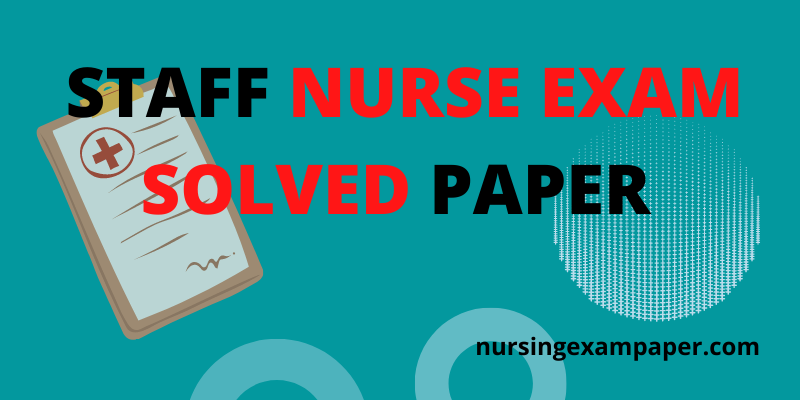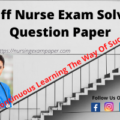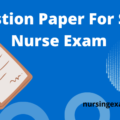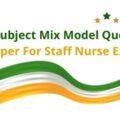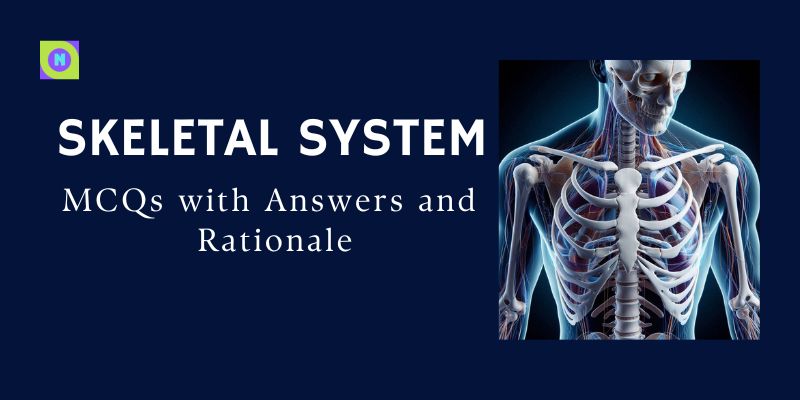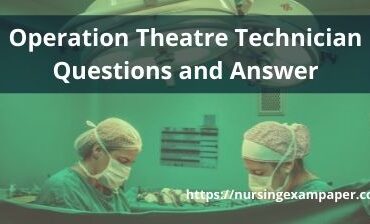STAFF NURSE EXAM SOLVED PAPER OF NURSING IN HEALTH SERVICES DEPT (CATEGORY NO: 224/2009)
Q 1. Which of the following is an important nursing intervention for a patient with Cushing Syndrome?
(a) Left Middle Cerebral Artery
(b) Observe for hypotension
(c) Protect from infection
(d) Restrict carbohydrate intake.
Ans: Protect from infection.
Q 2. Involvement of which of the following structures will lead to right-sided hemiplegia and aphasia?
(a) Left Middle Cerebral Artery
(b) Vertebral Artery
(c) Brain stem
(d) Right Middle Cerebral Artery.
Ans: Left Middle Cerebral Artery
Q 3. Which one of the following is a common response expected in a patient with stroke, to the change in body image?
(a) Denial
(b) Disassociation
(c) Delusion
(d) Depression.
Ans: Depression.
AIIMS STAFF NURSE SOLVED EXAM PAPER
Q 4. For doing nasotracheal suctioning, during which of the following patient activities, the catheter should be inserted?
(a) Swallowing
(b) Inhaling
(c) Exhaling
(d) Retching
Ans: Inhaling
Q 5. What is cyanosis?
(a) Blue discoloration of the skin.
(b) Red discoloration of the skin.
(c) Yellow discoloration of the skin.
( d) Pink discoloration of the skin.
Ans. Blue discoloration of the skin.
Q 6. Which of the following developmental stage corresponds to infancy?
(A) Trust Vs Mistrust
(b) Autonomy Vs Shame
(c) Initiative Vs Guilt
(d) Industry Vs Inferiority.
Ans: Trust Vs Mistrust
Q 7. The head circumference of a normal infant is –
(a) 30-32 cm
(b) 33-35 cm
(c) 37-40 cm
(d) 40-45 cm
Ans. 33-35 cm
Q 8. Which of the following structures controls heat loss?
(a) Anterior pituitary
(b) Posterior pituitary
(c) Posterior hypothalamus
(d) Anterior hypothalamus
Ans: Anterior hypothalamus
Q 9. How many drops in a standard drip set make one ml.?
(a) 12
(b) 15
(c) 18
(d) 21
Ans 15
Q 10. The prescription orders 0.125 mg digoxin orally. Tablets containing 0.25 mg are available. How many tablets will you administer?
(a) 1/4
(b) 1/2
(C) 2/3
(d) 3/5
Ans 1/2
junior public health nurse solved question paper
Q 11. A patient who is receiving intravenous fluids develops tenderness, warmth, erythema, and pain at the infusion site. Which of the following conditions will you suspect?
(a) Sepsis
(b) Infiltration
(c) Fluid overload
(d) Phlebitis
Ans Phlebitis
Q 12. What is the intrinsic rate of the normal A-V node?
(a) 30-50 per minute
(b) 60-80 per minute
(c) 70-90 per minute
(d) 40-60 per minute
Ans 40-60 per minute
Q 13. Which of the following structures is the pacemaker of the heart?
(a) S-A node
(b) Septum
(c) A-V node
(d) Bundle of His
Ans: S-A node
Questions from nurse exam solved paper
Q 14. The prescription is for two tablespoons of milk of magnesia. How many ml. will you give?
(a) 10 ml
(b) 15 ml
(c) 30 ml
(d) 60 ml
Ans: 30 ml
Q 15. Which of the following is intravascular fluid?
(a) Lymph
(b) Pleural fluid
(c) Plasma
(d) Synovial fluid
Ans: Plasma
Q 16. Which of the following is an isotonic solution?
(a) Lactated Ringers
(b) Half –Normal Saline
(c) One-third Normal Saline
(d) Mannitol
Ans: Lactated Ringers
Solved Question Paper For Staff Nurse Exam
Q 17. Which of the following drugs provide relief of anxiety and decrease both preload and afterload?
(a) Amrinone
(b) Morphine sulfate
(c) Furosemide
(d) Dobutamine
Ans: Morphine sulfate
Q 18. A patient admitted with vomiting, has the following arterial blood gas levels-pH 7.30; PaCO2 36 mm Hg; Pa O2 92mm Hg; and HCO3 18; what is the acid-base imbalance that is present?
(a) Metabolic alkalosis
(b) Metabolic acidosis
(c) Respiratory alkalosis
(d) Respiratory acidosis
Ans: Metabolic acidosis
Q 19. Which of the following is a first-line drug used for pain management?
(a) Acetaminophen
(b) Clonidine
(c) Morphine
(d) Ketamine
Ans: Acetaminophen
ESIC nursing exam model questions
Q 20. Which of the following is the organism that causes peptic ulcer disease?
(a) Staphylococcus
(b) Corynebacterium
(c) Helicobacter pylori
(d) Streptococcus.
Ans: Helicobacter pylori
All Subject Mix Model Question Paper For Staff Nurse Exam
Q 21. Which of the following nutrients helps for tissue repair?
(a) Vitamin
(b) Fat
(c) Carbohydrate
(d) Protein
Ans: Protein
Q 22. Which of the following patient activities helps to relax the external anal sphincter, while administering enema?
(a) Separating the buttocks
(b) Lubricating the catheter tip
(c) Inserting the catheter slowly
(d) Breathing out through the mouth.
Ans: Breathing out through the mouth.
Q 23. Which of the following is the best method to confirm the placement of the nasogastric tube:
(a) Checking the patient’s ability to talk
(b) Aspiration of intestinal content
(c) Introducing air and auscultating
(d) X-ray of chest and abdomen
Ans: X-ray of chest and abdomen
Q 24. Which of the following is a common cause of orthostatic hypotension in a bedridden Patient?
(a) Increased autonomic response
(b) Decreased circulating blood volume
(c) Increased cardiac output
(d) Decreased blood pooling
Ans: Decreased circulating blood volume.
Q 25. Which of the following body parts has a condyloid joint?
(a) Shoulder
(b) Elbow
(c) Wrist
(d) Forearm
Ans: Wrist
jipmer staff nurse exam model question paper
Solved Question Paper For Staff Nurse Exam
RRB Question Paper Previous Year
Railway staff nurse question paper 2019
Railway nursing exam paper 2019 pdf
Thanks for reading. if you have any query please comment below. we answer your query as fast as we can.
